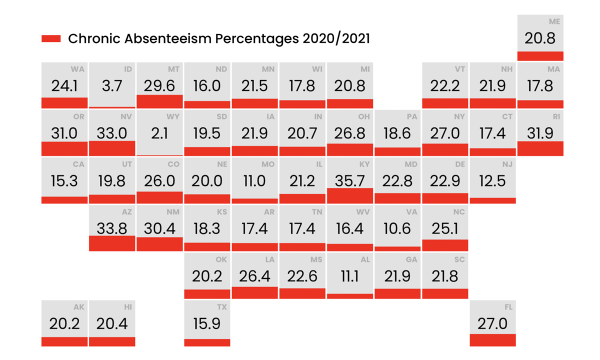Absenteeism has risen in recent years by 30% with a major factor being the COVID-19 pandemic hurting students across all demographics, but also other factors like bus driver shortage, teacher shortage, lack of funding of schools and dilapidated schools.
Data from the U.S. Department of Education shows that in 2021-22, 66% of enrolled students attended a school with high or extreme levels of chronic absence missing up to four weeks during the school year.

National data shows that nearly 29.7% were chronically absent in the 2021-22 school year. Roughly 6.5 million more students were missing 10% or more of school days during the year. Chronic absenteeism has remained extremely high even throughout the 2022-23 school year compared to the previous year.
The rising absenteeism rate could be the cause for falling test scores and an increase in juvenile crime. Students who miss a lot of school could face higher risks of failing out of high school and suffering in subjects like reading and math.
COVID-19 made it harder for teachers and guidance counselors to help students. Not only were students ill during this time, so were teachers, which impacted the already existing teacher shortages.
In September of 2023, the Biden administration planned to tackle the chronic absenteeism as part of a mission to help with students learning and engagement in school. The Biden administration’s plan relied heavily on teachers and guidance counselors to help enforce these policies
Such high numbers of chronically absent students are making it too hard for just a single social worker or counselor to address.
“I deal with a lot of students as a guidance counselor, and I have to make the best judgements for these students for them to pass their classes or graduate high school. I have a lot students who come to me that suffer with mental illnesses like stress and anxiety, but also like schizophrenia and depression, so it can be a lot for just me as there is a wide range of students that I have to deal with.” – Emily Dempsey, Forsyth Central Guidance Counselor.
Missing school can have long-lasting impacts that can carry over into adulthood. Chronic absenteeism can make it harder for children to meet early learning milestones which can lead to poorer academic performance. Chronic absenteeism could account for 27% of test scores declining in subjects like math and 45% of test scores declining in reading.
The Biden administration looks to combat the situation nationwide but certain states are taking different approaches to the issue as some states have been hit harder than others when dealing with chronic absenteeism.
The Atlanta school board passed a plan to pay a new company $285,000 a year to notify parents electronically when students are absent. In certain Georgia counties they are experiencing different levels of absenteeism which is up to the district’s truancy task force who are composed of social service providers and district school boards to determine how to combat the rising affects of chronic absenteeism.
The state average for Georgia is 24.4% while counties in Georgia for the 2021-22 school year for public schools varied:
- Atlanta public schools 38.4%
- Clayton County 30.7%
- DeKalb 29.4%
- Douglas 25.6%
- Fulton 25.4%
- Cobb 23.2%
- Cherokee 20%
- Forsyth 18.2%
- Gwinnett 17.8%






























